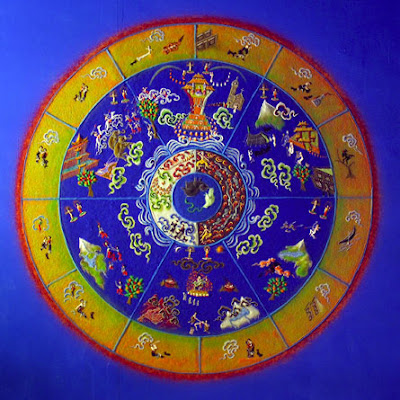"Este ano se celebram 800 anos de nascimento de Jalal ud-Din Rumi (1207-1273), o maior dos místicos islâmicos e extraordinário poeta do amor. Nasceu no Afeganistão, passou pelo Irã e viveu e morreu em Konia na Turquia.
Era um erudito professor de teologia, zeloso nos exercícios espirituais. Tudo mudou quando se encontrou com a figura misteriosa e fascinante do monge errante Shams de Tabriz. Como se diz na tradição sufi, foi "um encontro entre dois oceanos". Esse mestre misterioso iniciou Rumi na experiência mística do amor. Seu reconhecimento foi tão grande que lhe dedicou todo um livro com 3.230 versos o Divan de Shams de Tabriz. Divan significa coleção de poemas. A efusão do amor em Rumi é tão avassaladora que abraça tudo, o universo, a natureza, as pessoas e principalmente Deus. No fundo trata-se do único movimento do amor que não conhece divisões, mas que enlaça todas as coisas numa unidade última e radical tão bem expressa no poema Eu sou Tu : "Tu, que conheces Jalal ud-Din (nome de Rumi). Tu, o Um em tudo, diz quem sou. Diz:eu sou Tu". Ou o outro: "De mim não resta senão um nome, tudo o resto é Ele".
Essa experiência de união amorosa foi tão inspiradora que fez Rumi produzir uma obra de 40.00 versos. Famosos são o Masnavi (poemas de cunho reflexivo-teológico), Rubai-yat (Canção de amor por Deus) e o já citado Divan de Tabriz. Próprio da experiência místico-amorosa é a embriaguês do amor que faz do místico um "louco de Deus" como eram São Francisco de Assis, Santa Tereza d’Ávila, Santa Xênia da Rússia e também Rumi. Num poema do Rubai’yat diz: "hoje eu não estou ébrio, sou os milhares de ébrios da terra. Eu estou louco e amo todos os loucos, hoje".
Como expressão desta loucura divina inventou a sama, a dança extática. Trata-se de dançar girando em torno de si e ao redor de um eixo que representa o sol. Cada dervixe girante, assim se chamam os dançantes, se sente como um planeta girando ao redor do sol que é Deus. Dificilmente na história da mística universal encontramos poemas de amor com tal imediatez, sensibilidade e paixão que aqueles escritos pelo islâmico Rumi. É como uma fuga de mil motivos que vão e vêm sem cessar. Num poema de Rubai-yat canta: "Tu, único sol, vem! Sem Ti as flores murcham, vem! Sem Ti o mundo não é senão pó e cinza. Este banquete e esta alegria, sem Ti, são totalmente vazios, vem!".
Um dos mais belos poemas, por sua densidade amorosa, me parece ser este, tirado do Rubai’yat: "O teu amor veio até meu coração e partiu feliz. Depois retornou, vestiu a veste do amor, mas mais uma vez foi embora. Timidamente lhe supliquei que ficasse comigo ao menos por alguns dias. Ele se sentou junto a mim e se esqueceu de partir".
A mística desafia a razão analítica. Ela a ultrapassa porque expressa a dimensão do espírito, aquele momento em que o ser humano se descobre a si mesmo como parte de um Todo, como projeto infinito e mistério abissal inexprimível. Bem notava o filósofo e matemático Ludwig Wittgenstein na proposição VI de seu Tractatus logicophilosophicus: "O inexprimível se mostra, é o místico". E termina na proposição VII com esta frase lapidar: "Sobre o que não podemos falar, devemos calar". É o que fazem os místicos. Guardam o nobre silêncio ou então cantam como fez Rumi, mas de um modo tal que a palavra nos conduz ao silêncio reverente."
Por Leonardo Boff
Do Jornal virtual MONTBLÄAT*
*Jornal virtual Montbläat – RJ, 26/1/2007 – Nº 222 - www.montblaat.com















